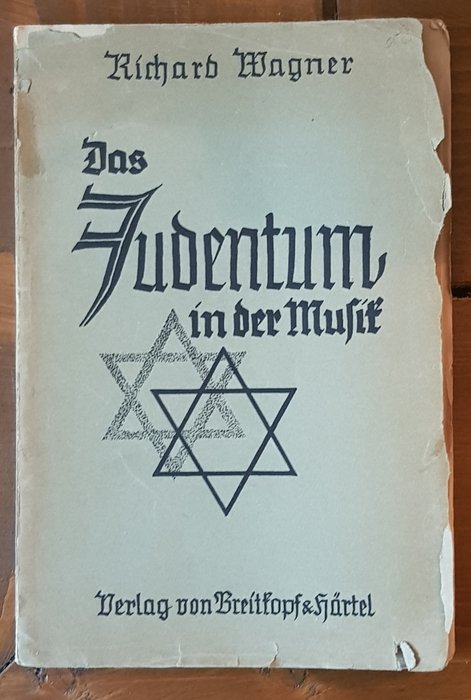I’m dismayed and perplexed that a Jewish
conductor recently performed a Richard Wagner opera in Perth and that some Jews
attended the performance.
Music is obviously an expression of the
composer's feelings and worldview. That's why music is often described and
discussed in the context of the composer's frame of mind at the time and place
it was composed. For this reason, I could not countenance
attending a Wagner performance. He promulgated many anti-Semitic views over the
course of his life. He frequently accused Jews of being a harmful foreign
element in Germany and called for the annihilation of Jewish culture. He conceived
the terms "Jewish problem" and "final solution," which Nazism
later adopted.
Wagner and his "Bayreuth Circle"
were the "intellectual" and "spiritual" fathers of
genocidal Nazism. Hitler and his regime were inspired by Wagnerian thought and
music. Hitler said that that "there is only one legitimate predecessor to
national socialism: Wagner" and venerated him, saying, "Whoever wants
to understand National Socialist Germany must know Wagner." He was so
enraptured with him that he is quoted as having said "Richard Wagner is my
religion."

Wagner's first and most controversial
anti-Semitic essay was "Das Judenthum in der Musik",
originally published in 1850 in the Neue Zeitschrift under the pen-name "K.
Freigedenk" ("free thought") and later under his own
name. It that essay, Wagner expressed his fervent revulsion for what he
described as "cursed Jewish scum" and described Jews as "hostile
to European civilization" and "ruling the world through money."
He said that "Judaism is rotten at the core and is a religion of hatred,"
described the cultured Jew as "the most heartless of all human beings"
and referred to Jewish composers as being "comparable to worms feeding
on the body of art." He claimed that the German people were repelled
by Jews due to their alien appearance and behavior — "freaks of Nature"
with "creaking, squeaking, buzzing" voices — so that "with
all our speaking and writing in favour of the Jews' emancipation, we always
felt instinctively repelled by any actual, operative contact with them."
In the conclusion to the essay, he wrote of the Jews that "only one
thing can redeem you from the burden of your curse: the redemption of Ahasuerus
– going under!"
Music critic Barry Millington said that “Anti-Semitism
is woven into the fabric of the music of Wagner.”
I ask those who claim that they can ignore
Wagner’s repulsive philosophy and focus in isolation on the music, to consider
the following example of his art explicitly expressing his anti-Semitism.
In Parsifal, Wagner’s final opera, Kundry,
is explicitly Jewish. Kundry is the archetypal Jew of medieval myth, the
wandering Ahasuerus, cursed to roam the world eternally for mocking Christ on
the cross. To music of an inexpressible weariness, she confesses: “I saw
Him—Him—and laughed!” For this sin of laughter, she is damned to wander “from
world to world,” seeking a redemption that always eludes her. Like the Jews
of Das Judentum in Musik, she longs for community but remains forever
outside it. Desperate for salvation, she is cursed to be nothing but a source
of corruption. When her salvation does at last arrive, in the grand
reconciliation of Parsifal’s third act, it is consummated by her death, thus
perfectly fulfilling Wagner’s chilling conclusion of Das Judentum in Musik:
“one thing only can redeem you [Jews] from the burden of your curse: the
redemption of Ahasuerus—Going under!”
Wagner’s second wife, Cosima recorded in
her diary on 28 March1881, that Wagner considered Parsifal “a retort to
Gobineau”, who had characterized the Germans as the “last card” of nature,
probably a reference to his despair that evolution was destroying his beloved,
superior "Aryan race..."
After Wagner's death in 1883, Wagner's family continued to promote his vile anti-Semitic ideology, and became a central focus for Jew baiters and radical right-wing Germans. His daughter Eva married Houston Chamberlain, an Englishman who crafted the ideology for Nazi racism in his notorious book "The Foundations of the Nineteenth Century." Bayreuth became a meeting place for fascists and extreme right-wing Wagner fans that came to be known as the Bayreuth circle. Winifred Wagner, the English-born widow of Wagner’s son Siegfried, said in the 1970s: “If Hitler were to walk in through that door now, for instance, I’d be as happy and glad to see and have him here as ever…”
No comments:
Post a Comment